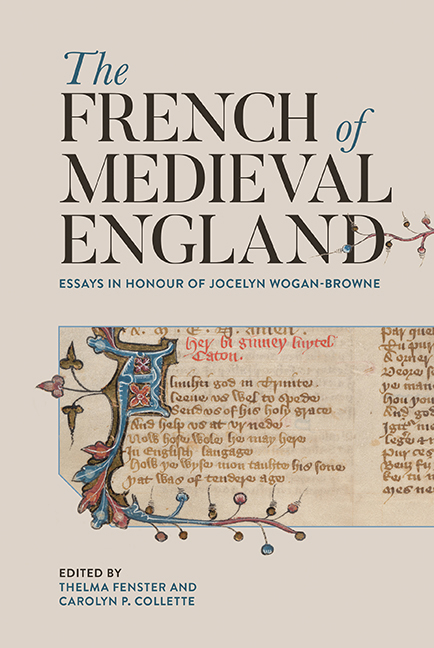Book contents
- Frontmatter
- Contents
- List of Illustrations
- List of Contributors
- List of Abbreviations
- Foreword: ‘The Light I Never Left Behind’: Jocelyn Wogan-Browne
- Introduction: Recognizing the French of Medieval England
- 1 The Gloss to Philippe de Thaon's Comput and the French of England's Beginnings
- 2 The Scandals of Medieval Translation: Thinking Difference in Francophone Texts and Manuscripts
- 3 Contrafacture and Translation: The Prisoner's Lament
- 4 Complaining about the King in French in Thomas Wright's Political Songs of England
- 5 The Chanson d’Aspremont in Bodmer 11 and Plantagenet Propaganda
- 6 The Use of Anglo-Norman in Day-to-Day Communication during the Anglo-Scottish Wars (1295–1314)
- 7 Middle English Borrowing from French: Nouns and Verbs of Interpersonal Cognition in the Early South English Legendary
- 8 William Langland Reads Robert Grosseteste
- 9 Disability Networks in the Campsey Manuscript
- 10 English Women and Their French Books: Teaching about the Jews in Medieval England
- 11 French Residents in England at the Start of the Hundred Years War: Learning English, Speaking English and Becoming English in 1346
- 12 French Immigrants and the French Language in Late-Medieval England
- 13 Fashioning a Useable Linguistic Past: The French of Medieval England and the Invention of a National Vernacular in Early Modern France
- 14 Admiring Ambivalence: on Paul Meyer's Anglo-Norman Scholarship
- 15 Twenty-First Century Gower: The Theology of Marriage in John Gower's Traitié and the Turn toward French
- 16 Royaumes sans frontières: The Place of England in the Long Twelfth Century
- Afterword
- Bibliography
- Index
- Publications of Jocelyn Wogan-Browne
- Tabula Gratulatoria
12 - French Immigrants and the French Language in Late-Medieval England
Published online by Cambridge University Press: 12 August 2020
- Frontmatter
- Contents
- List of Illustrations
- List of Contributors
- List of Abbreviations
- Foreword: ‘The Light I Never Left Behind’: Jocelyn Wogan-Browne
- Introduction: Recognizing the French of Medieval England
- 1 The Gloss to Philippe de Thaon's Comput and the French of England's Beginnings
- 2 The Scandals of Medieval Translation: Thinking Difference in Francophone Texts and Manuscripts
- 3 Contrafacture and Translation: The Prisoner's Lament
- 4 Complaining about the King in French in Thomas Wright's Political Songs of England
- 5 The Chanson d’Aspremont in Bodmer 11 and Plantagenet Propaganda
- 6 The Use of Anglo-Norman in Day-to-Day Communication during the Anglo-Scottish Wars (1295–1314)
- 7 Middle English Borrowing from French: Nouns and Verbs of Interpersonal Cognition in the Early South English Legendary
- 8 William Langland Reads Robert Grosseteste
- 9 Disability Networks in the Campsey Manuscript
- 10 English Women and Their French Books: Teaching about the Jews in Medieval England
- 11 French Residents in England at the Start of the Hundred Years War: Learning English, Speaking English and Becoming English in 1346
- 12 French Immigrants and the French Language in Late-Medieval England
- 13 Fashioning a Useable Linguistic Past: The French of Medieval England and the Invention of a National Vernacular in Early Modern France
- 14 Admiring Ambivalence: on Paul Meyer's Anglo-Norman Scholarship
- 15 Twenty-First Century Gower: The Theology of Marriage in John Gower's Traitié and the Turn toward French
- 16 Royaumes sans frontières: The Place of England in the Long Twelfth Century
- Afterword
- Bibliography
- Index
- Publications of Jocelyn Wogan-Browne
- Tabula Gratulatoria
Summary
Scholars of medieval England have rarely discussed language socialization as part of the immigrant experience, focusing instead on the political and economic tensions created between natives and foreign migrants to England. When discussed at all, language socialization has been treated in the context of languagelearning strategies, especially in terms of how the English learned French and Latin, rather than how French-language speakers coped in England. This essay adopts a slightly different approach to understanding language socialization and the survival of spoken French in later medieval England by contextualizing the integration of native French-speakers into English society, particularly in the south-western county of Devon. It attempts to overcome the paucity of direct evidence about French-speaking migrants, most of whom were of low status and probably illiterate, by drawing on the records of taxes imposed on alien residents of medieval England in the mid-fifteenth century, supplemented by additional prosopographical information.
The starting point for this analysis is the so-called ‘alien subsidy’ of 1440, a tax assessed on foreign or ‘alien’ residents of medieval England, whose records have now been made available online in a searchable database by the England's Immigrants project. The taxpayers recorded in the returns of 1440 and later alien subsidies (the last one was approved in 1487), along with the aliens singled out in the first Tudor subsidy of 1523, account for the bulk of the project's almost 65,000 names of foreign-born residents in England from 1330 to 1550. These taxes on first-generation foreigners were the culmination of anti-alien sentiment that had been mounting in England for some time, evident in a series of restrictive measures aimed initially at foreign merchants and clergy. Because the coverage of the alien subsidies declined over time as local assessors grew lax and particular foreign groups (such as the Irish, Bretons, Channel Islanders, Spanish and French living under English rule in Normandy and Gascony) became exempt, the 1440 tax offers the best picture of England's foreign population at one moment in time. Its listings separate householders (heads of households taxed at 16d each) from non-householders such as servants and general laborers (taxed at 6d), although the default rates were enormous, especially among non-householders.
- Type
- Chapter
- Information
- The French of Medieval EnglandEssays in Honour of Jocelyn Wogan-Browne, pp. 206 - 224Publisher: Boydell & BrewerPrint publication year: 2017
- 2
- Cited by



